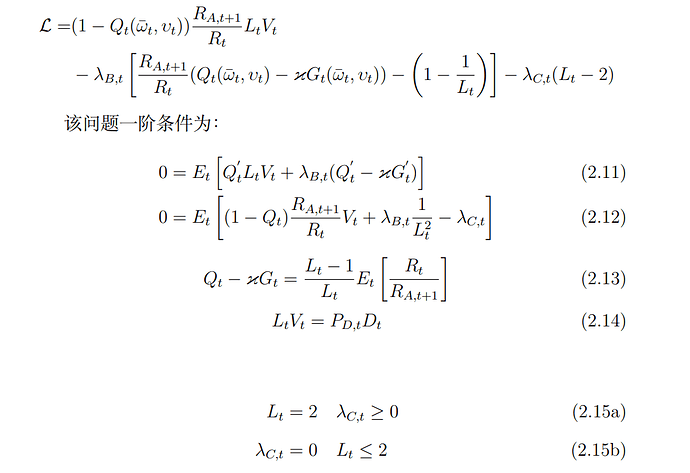Dear Professors and friends
I ran my mod file with OCCbin by dynare 5.1, but the program just tell me that
Occbin: Simulation did not converge, increase maxit or check_ahead_periods.
I have tried to expand my period and iteration but it did not help. What is the wrong I made?
Prob_Occbin.mod (15.7 KB)
I think your setup is wrong. How are regime switches supposed to function when you hardcode
[name='LEVERAGE CONSTRAINT',relax='Leverage']
VAR_LAMBDAC=0;
[name='LEVERAGE CONSTRAINT',bind='Leverage']
VAR_L = 0.963;
Thank you very much Professor. At the basic regime, my model can run well, but when I add OCCbin into it, it go wrong. I want to add a constraint that VAR_L(which means leverage) less than or equal to 0.963( little bigger than its steady state) in entrepreneur’s optimal question. This optimal qustion contains 4 equation: 10, 11, 12, 14. Then I just set up this occational binding constraint as slack complementary condition.
I also have suspected that my setup may be wrong, but the process I contruct my model seems make sense. Maybe can you find the fault I make? Again, thank you very much.
How exactly does the complementary slackness condition look like mathematically?
This is entrepreneur’s optimal problem which is based on the BGG(1999) framework. I add and constraint that L less than or equal to a certain number(This is 2, but it can be any other number which is slightly greater than steady state).
These are first-order condition. 2.11 is derivative to omegabar, 2.12 is to L, 2.13 is to lambdaB, 2.14 is uncorrelated, 2.15 is a set of complementary slackness condition.
Your model looks numerically problematic. Have a look at the size of the VAR_LAMBDAC response that is relevant for the complementary slackness constraint.
Prob_Occbin.mod (15.6 KB)
Do you mean that maybe the condition about returning to relax regime is problematic? is it VAR_LAMBDAC should be set as less than another number instead of 0?
I mean that even for big shocks, the movements of VAR_LAMBDAC are tiny (10e-17). That may make it hard to detect changes.

